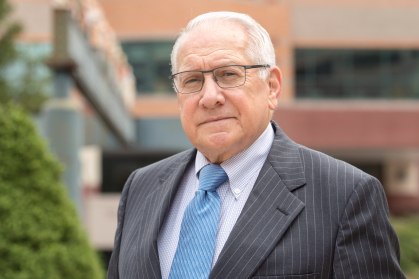A Rare Gift
New Jersey business executive James Tuchi pledges $8 million to support the innovative programs of two Rutgers doctors who saved his life years ago.

Gratitude can span decades, and it culminated recently with a grateful patient’s extraordinary act of generosity. Acknowledging the care he received from two Rutgers doctors, James Tuchi, a New Jersey business leader, has pledged $8 million to support innovative programs at Rutgers Biomedical and Health Sciences (RBHS) and the School of Communication and Information. The gift, says Brian Strom, chancellor of RBHS, “will have enormous impact on many different levels.”
Tuchi’s gift had its genesis in 1994, when Tuchi underwent quadruple bypass surgery at Robert Wood Johnson University Hospital in New Brunswick. His cardiology care at that time and ever since has been guided by Clifton R. Lacy, the former New Jersey health commissioner and former chief of cardiology at Rutgers Robert Wood Johnson Medical School. Lacy RC’75, RWJMS’79, now a distinguished professor at the School of Communication and Information, introduced Tuchi to Jeffrey Carson, who became Tuchi’s primary care physician. “If not for them and the people at Robert Wood Johnson, I wouldn’t be in the shape I’m in,” Tuchi says.
As president, CEO, and founder of Millennium Healthcare Solutions, Tuchi was a pioneer in the burgeoning field of telehealth, and his involvement in the pharmaceutical and life science industries continues at Global Health Sciences Inc., which he also founded. Not surprisingly, he took an interest in the research activities of both physicians and determined to help them when he was able.
His gift includes $3 million to support four research efforts run by Lacy to enhance management of mass exposure to anthrax; develop a portable device that detects lead in water and blood; improve bleeding control after trauma; and train leaders in effective risk and crisis communication. Tuchi’s largesse, Lacy says, “will allow for the acceleration of discovery, innovation, and development right here at Rutgers and also have a multiplier effect for a long time to come.”
Another $3 million will launch a clinical trial incubator headed up by Carson, provost of RBHS and the Richard C. Reynolds M.D. Chair in General Internal Medicine. The incubator will guide and train faculty seeking to redirect their careers into medical research and, says Carson, “will give individuals the tools necessary to succeed, build the capacity of faculty to initiate high-impact research, and bring important research projects to the university.”
Finally, $2 million will support Project ECHO, a guided-practice, tele-mentoring model, comprising telehealth clinics in which practitioners across a variety of disciplines swap information and insight. “ECHO allows participants to share best practices,” says Kathy Dodsworth-Rugani, the project’s executive director. “It is an all-teach, all-learn model to enable better access to health care for all.”
One of Tuchi’s goals in making his generous gift was to find “programs that could be immediately beneficial if they had funding.” The programs’ influence, indeed, will be virtually immediate. But, says Strom, “they’ll also have impact for many, many years to come.”